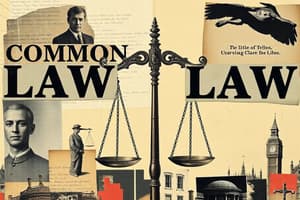Podcast
Questions and Answers
What primarily influences the Common Law system?
What primarily influences the Common Law system?
- International treaties and agreements
- Codified statutes and detailed regulations
- Public opinion and social customs
- Court decisions and legal precedents (correct)
Which statement about Civil Law contracts is correct?
Which statement about Civil Law contracts is correct?
- Parties need to specify all consequences for non-compliance.
- Default rules are often automatically applied. (correct)
- Contracts must cover every possible scenario in detail.
- Courts rarely interpret implied terms in contracts.
How do Common Law contracts generally differ from Civil Law contracts in terms of detail?
How do Common Law contracts generally differ from Civil Law contracts in terms of detail?
- Common Law contracts automatically include numerous implied terms.
- Common Law contracts are typically less detailed than Civil Law contracts.
- Common Law contracts must be very detailed and explicit. (correct)
- Common Law contracts require fewer explicit terms compared to Civil Law contracts.
Which country exemplifies the Civil Law system?
Which country exemplifies the Civil Law system?
What might the government prohibit regarding essential services like water or electricity?
What might the government prohibit regarding essential services like water or electricity?
Why are common law contracts generally longer and more detailed?
Why are common law contracts generally longer and more detailed?
What is a requirement that might be imposed by law for transparency in contracts?
What is a requirement that might be imposed by law for transparency in contracts?
In what way might the law protect fairness during contract negotiations?
In what way might the law protect fairness during contract negotiations?
Why can civil law contracts be shorter than common law contracts?
Why can civil law contracts be shorter than common law contracts?
What might be a reason for the government to prohibit utility companies from cutting off essential services?
What might be a reason for the government to prohibit utility companies from cutting off essential services?
What does a Freedom of Information Act require regarding certain documents?
What does a Freedom of Information Act require regarding certain documents?
How does a law regulating utility services aim to balance consumer rights?
How does a law regulating utility services aim to balance consumer rights?
Which of the following is NOT related to government regulations on utility providers?
Which of the following is NOT related to government regulations on utility providers?
What is the purpose of requiring documents to be available to the public under a Freedom of Information Act (FOIA)?
What is the purpose of requiring documents to be available to the public under a Freedom of Information Act (FOIA)?
What might the public request access to regarding a government contract with a private company?
What might the public request access to regarding a government contract with a private company?
What assumption about contracts does the statement challenge?
What assumption about contracts does the statement challenge?
Which feature is characteristic of a common law system?
Which feature is characteristic of a common law system?
In a common law system, what is typically required of contracts?
In a common law system, what is typically required of contracts?
Which of the following statements about civil law systems is true?
Which of the following statements about civil law systems is true?
In the context of a common law system, how are judicial decisions regarded?
In the context of a common law system, how are judicial decisions regarded?
What approach is common in a civil law system regarding contract agreements?
What approach is common in a civil law system regarding contract agreements?
What is a key characteristic of Common Law systems?
What is a key characteristic of Common Law systems?
Which of the following best describes a major feature of Civil Law systems?
Which of the following best describes a major feature of Civil Law systems?
How are contracts typically treated under Common Law compared to Civil Law?
How are contracts typically treated under Common Law compared to Civil Law?
Flashcards
What influences Common Law?
What influences Common Law?
Court decisions and precedents from previous cases shape how future legal matters are handled.
Civil Law Contracts
Civil Law Contracts
Civil Law contracts often rely on default rules, meaning many terms are already set by law.
Common Law Contracts: Detail?
Common Law Contracts: Detail?
They are detailed and explicit, covering all agreements clearly, because the legal system has fewer automatic rules.
Civil Law System Example
Civil Law System Example
Signup and view all the flashcards
Essential Service Restrictions
Essential Service Restrictions
Signup and view all the flashcards
Why are Common Law Contracts lengthy?
Why are Common Law Contracts lengthy?
Signup and view all the flashcards
Contract Transparency Requirement
Contract Transparency Requirement
Signup and view all the flashcards
Contract Negotiation Fairness
Contract Negotiation Fairness
Signup and view all the flashcards
Why are Civil Law Contracts shorter?
Why are Civil Law Contracts shorter?
Signup and view all the flashcards
Prohibiting Utility Cut-offs
Prohibiting Utility Cut-offs
Signup and view all the flashcards
Freedom of Information Act
Freedom of Information Act
Signup and view all the flashcards
Balancing Consumer Rights
Balancing Consumer Rights
Signup and view all the flashcards
Utility Provider Regulation
Utility Provider Regulation
Signup and view all the flashcards
Purpose of FOIA
Purpose of FOIA
Signup and view all the flashcards
Public Access to Government Contracts
Public Access to Government Contracts
Signup and view all the flashcards
Contract Assumptions
Contract Assumptions
Signup and view all the flashcards
Common Law: Freedom of Contract
Common Law: Freedom of Contract
Signup and view all the flashcards
Common Law: Detail in Contracts
Common Law: Detail in Contracts
Signup and view all the flashcards
Civil Law: Codified Laws
Civil Law: Codified Laws
Signup and view all the flashcards
Common Law: Binding Decisions
Common Law: Binding Decisions
Signup and view all the flashcards
Civil Law: Implied Provisions
Civil Law: Implied Provisions
Signup and view all the flashcards
Common Law: Key Characteristic
Common Law: Key Characteristic
Signup and view all the flashcards
Civil Law: Legal Codes
Civil Law: Legal Codes
Signup and view all the flashcards
Common Law Contracts: Focus
Common Law Contracts: Focus
Signup and view all the flashcards
Study Notes
Common Law vs. Civil Law
- Common law systems rely heavily on court decisions and precedents, while civil law systems are more prescriptive with detailed statutes and laws.
- Common law countries include the US, UK, Canada, Australia, and India.
- Civil law countries include France, Germany, Japan, China, and most of South America.
Contract Implications
- Common law contracts typically require detailed terms and conditions to be explicitly stated, as the system doesn't provide many default rules.
- Civil law contracts can be shorter because many terms are automatically implied by law.
Government Protections in Contracts
- Common law systems might have specific laws protecting citizens in certain scenarios, especially for essential services like water or electricity.
- The government in a common law system might prohibit cutting off essential services for non-payment without following certain steps.
- Common law systems might also require transparency for government contracts through freedom of information acts.
Examples of Government Protections
- Prohibiting Service Cuts: The government might require utility companies to issue warnings or offer payment plans before cutting off essential services like water or electricity.
- Freedom of Information Act (FOIA): The government might require public disclosure of contract documents related to government projects or infrastructure programs.
Summary
- Common law contracts: Detailed, explicitly stated terms
- Civil law contracts: Shorter, implied terms based on existing laws
- Government role: Provides additional protection in common law countries for critical areas like utilities and transparency.
Studying That Suits You
Use AI to generate personalized quizzes and flashcards to suit your learning preferences.




